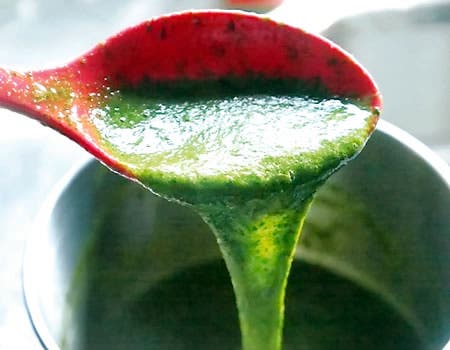
HAVING regular bowel movements is a sign of a healthy digestive system, and it prevents the discomfort of diarrhoea and constipation. But regularity it could be challenging due to stress, medications, a poor diet, lifestyle choices or a medical condition.
Some resort to popping laxatives or stool softeners and then others go for treatments like an enema for relief. But incorporating a few foods rich in fibre like Corchorus olitorius can be a safe and effective alternative to ensure regularity.
Experts said that no matter the cause, green leafy vegetables like jute leaf (ewedu) soup can help to improve bowel movement, so ensure relief. Its dietary fibre can increase stool frequency, stool volume and improve the intestinal environment in healthy individuals.
In a study, researchers tested the bowel movement improvement by Corchorus olitorius-containing food (AOTSUBU®) consumption in 22 healthy Japanese adults who were typically defecating three to five times per week and were not consuming enough dietary fibre. They were recruited from January 2019 to February 2019.
Individuals who take “Foods for Specified Health Uses,” “Foods with Functional Claims,” or other functional food/beverage daily; allergic to medicines and/or the test-food-related products as well as those who are currently taking medicines (including herbal medicines) and supplements were excluded from the study.
Corchorus olitorius, commonly called jute leaf (ewedu), Ewedu in Yoruba, Lalo in Hausa or Ahihara in Igbo language, is reported to be a folk remedy for aches and pains, dysentery, fever, and pectoral pains. Ayurvedics use the leaves of jute for treating pain, piles, stomach ulcer and tumours.
Also, the leaves are used for the treatment of gonorrhoea, infertility, increase the flow of breast milk in nursing women, prevent convulsion and as a purgative agent. The cold-infusion is also said to restore appetite and strength.
This green leafy vegetable is rich in beta-carotene for good eyesight; iron for healthy red blood cells; calcium for strong bones and teeth; and vitamin C for smooth, clear skin, strong immune cells, and fast wound healing.
People who are constipated may have just one or more of many symptoms that include fewer than three bowel movements per week, straining to start or complete a bowel movement, stool consistency that looks like rocks and pebbles and a feeling of incomplete emptying.
Depending on the severity, constipation can cause problems like abdominal pain and gas. Excessive straining during bowel movements may also cause haemorrhoids (swollen anal veins), anal fissures (tears) and rectal prolapse, where part of the rectum sticks out through the anus.
For the study, participants were randomly allocated to the corchorus olitorius–derived dietary fibre group or the placebo group by using a computerized random number generator. Each individual was administered with assigned 30 tablets ((AOTSUBU®) or placebo) daily for two weeks. It was in the 2020 edition of the journal, Functional Foods in Health & Disease.
They recorded their defecation condition in a bowel movement diary from a week before the start of test food consumption to the day before two weeks after the start of the test-food consumption (three weeks in total). The defecation conditions considered included frequency of defecation, stool days per week, stool volume, stool shape, stool smell, and exhilarating feeling.
At one and two weeks after the start of the test-food consumption, the Corchorus olitorius –derived dietary fibre group exhibited a significant increase in stool days, stool frequency, and stool volume compared with the placebo group.
Regarding the occupancy rate of enteric bacteria, Prevotella and Clostridium cluster IV were significantly increased in the test-food consumption group compared with those in the placebo group at two weeks after the start of the test-food consumption.
As for organic acids in faeces, n-butyric acid was significantly higher in the Corchorus olitorius –derived dietary fibre group than in the placebo group at two weeks after the start of the test-food consumption. Furthermore, no safety concerns were noted.
Organic acids generated by enteric bacteria increase the peristaltic movement of intestines and mucus secretion at the large-intestine mucosa, allowing the faeces to pass more smoothly.
They declared “In this study, one of the factors improving bowel movement by Corchorus olitorius–derived dietary fibre consumption might be the increase of the faecal water content.”
Previously, researchers in studies involving healthy adult subjects that consumed ewedu said this tended to increase the faecal water content. It plentifully contains polysaccharide, a kind of water-soluble dietary fibre-forming mucus, which increases the weight and the water holding capacity of the contents of the intestine in the laboratory.
END

Be the first to comment